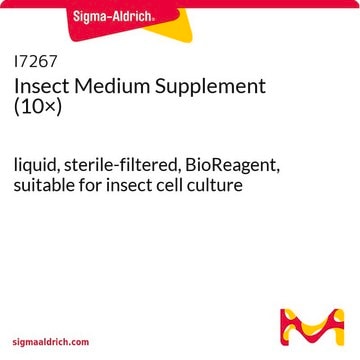S3652
Shields and Sang M3 Insect Medium
With ʟ-glutamine and potassium bicarbonate, liquid, sterile-filtered, suitable for insect cell culture
Sinónimos:
Insect Medium, M3 Insect Medium, Sang Insect Medium
About This Item
Productos recomendados
product name
Shields and Sang M3 Insect Medium, With L-glutamine and potassium bicarbonate., liquid, sterile-filtered, suitable for insect cell culture
Quality Level
sterility
sterile-filtered
form
liquid
technique(s)
cell culture | insect: suitable
components
glucose: 10 g/L (Dextro)
L-glutamine: 0.6 g/L
shipped in
ambient
storage temp.
2-8°C
¿Está buscando productos similares? Visita Guía de comparación de productos
Application
Biochem/physiol Actions
also commonly purchased with this product
Storage Class
12 - Non Combustible Liquids
wgk_germany
WGK 3
flash_point_f
Not applicable
flash_point_c
Not applicable
Certificados de análisis (COA)
Busque Certificados de análisis (COA) introduciendo el número de lote del producto. Los números de lote se encuentran en la etiqueta del producto después de las palabras «Lot» o «Batch»
¿Ya tiene este producto?
Encuentre la documentación para los productos que ha comprado recientemente en la Biblioteca de documentos.
Los clientes también vieron
Nuestro equipo de científicos tiene experiencia en todas las áreas de investigación: Ciencias de la vida, Ciencia de los materiales, Síntesis química, Cromatografía, Analítica y muchas otras.
Póngase en contacto con el Servicio técnico






